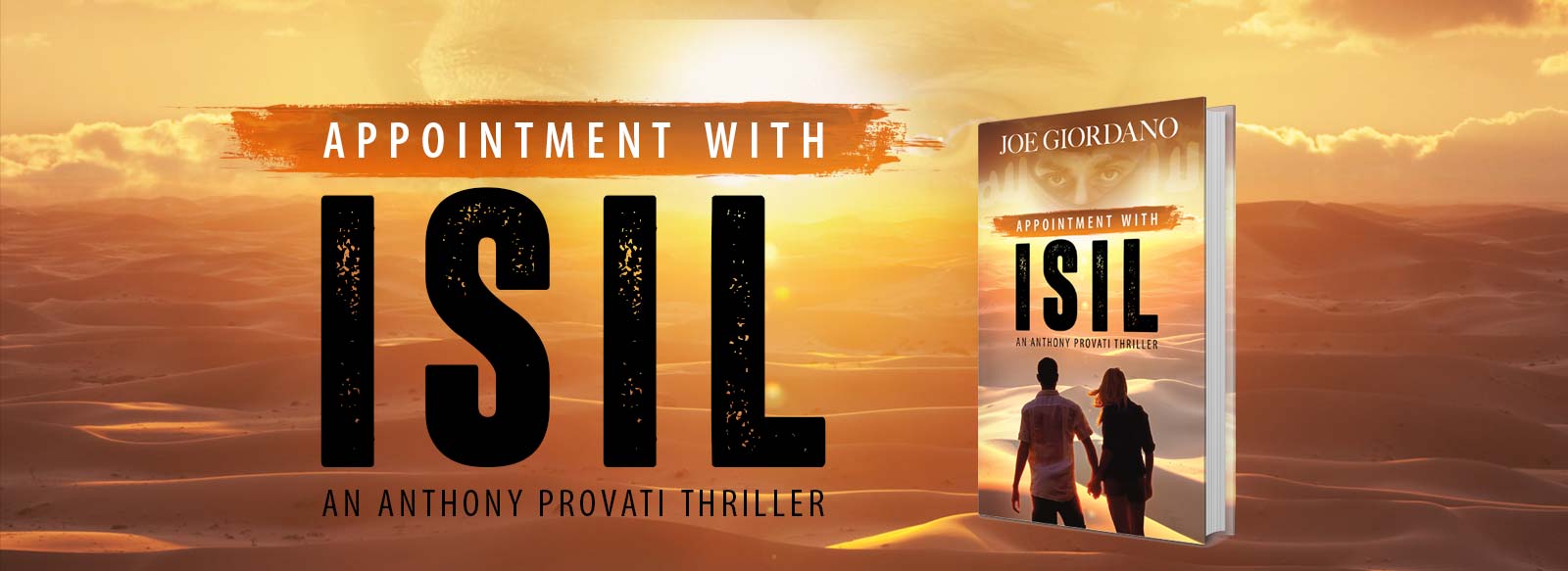
The World is a City.
Joe Giordano’s literary thriller Appointment With ISIL balances considerations of genre (characterization, pacing, mood) with a subtle but definite awareness of literary form and function. Much like his debut novel Birds of Passage, Giordano shows a penchant for sharp scenes, concise dialogue that has the bite of a Dick Tracy strip without devolving into comic-like caricatures. Unlike Birds of Passage though, Giordano’s Appointment With ISIL isn’t a turn of the century coming-of-age immigrant crime noir; rather, it fuses the personality-driven suspense of James Patterson with the characterological fueled plot of Stieg Larsson. Giordano’s prose isn’t anachronistic but his deep interest in the language of the early twentieth century seems to carry over into his narrative. What comes about is a strange but satisfying mixture of colorful dialogue a la a Mickey Spillane hard-boiled crime noir juxtaposed with modern concerns of radical religious terrorism on global scales. Key to the work are Giordano’s proclivity for detail, which may remind one of Tom Clancy. However, where Clancy’s descriptions of weaponry and military protocol carry the brunt of the narrative weight, Giordano manages to give meticulous attention to the nuts and bolts of structure and background while keeping the story awake and moving.
Giordano’s characters hold readers alert, on the edge of their seat. You live the anxiety and unknowingness that many of his protagonists must absorb as a life pattern. Giordano does this in part by favoring a varied narrative quilt. The protagonist is only one element in a larger world. Appointment With ISIL travels the globe from the side-streets of a busy Egyptian city to the lavish art galleries of Manhattan. Giordano’s protagonist, Anthony Provati, is an art dealer with family connections to the mob and a boyish sex drive that gets him into more than one snafu. When his insatiable curiosity lands him in trouble with Russian mob boss Gorgon Malakhov (after too long a leer at Sophia, Malakhov’s girl), a concatenation of troubles and conflicts begin.
Giordano’s hook in all this isn’t just the narrative suspense (which he manages well with more cliffs and valleys than the American Southwest). It is the simplicity of a style that organizes complex relationships between people and cultures and allows them to play out with no polemic narration to organize what is, in reality and in his novel, a chaotic mass of people and situations. Giordano’s minimal orchestration bares comparison to John Fante’s Ask The Dust, a novel that runs complex themes under simple sentences and settings. His hook is further enhanced by the journalistic interest he takes in his characters. The narrative voice isn’t biased but intrigued by the plight of the individuals in the story, no matter their affiliation with Provati and his mission to subvert militants from destroying a sacred religious site. Combine this with a panoramic gesture that avoids typecasting Middle-Eastern characters as flat Orientalist regurgitations. The story comes off cleaner, better for its resolve to take the more difficult yet higher road, humanizing what could easily be one-dimensional, throwaway villain archetypes. Style-wise, think of Jon Hersey and Studs Terkel. People, even those that readers may feel aversive to, are given a voice and a background.
The beat of the narrative is toward suspense. That said, Giordano does an incredible job of allowing the story to spin toward dissonance while never totally loosening his grip from the handlebars. It’s intriguing to see how, as Giordano broadens his landscape from a few neighborhoods in New York City to the Mediterranean, the dissonance he sets up flattens out and begins to point toward a center. The imminent destruction gradually dissipates. Villains are caught, killed or frustrated. What begins as a narrative of relentless push and speed opens the space of its previous acceleration to reveal a secure cadence. Characters act according to patterns and beats. We suddenly realize that nodes have been set deep in the narration and Giordano returns us to them. Particular phrases are repeated like recurring motifs in a musical score. Early on they seem innocuous but when they reappear they are reified by the accumulation of events and take on almost prophetic tones.
Giordano’s narrative worlds are cities. Like cities, their speed is determined by the narrow spaces in which they are given to act themselves out. It isn’t a detriment but a reality that the world has become much more akin to an urban alleyway without the definitive boundaries of skyscrapers and gridded streets. What Giordano’s Appointment With ISIL does, interestingly, is harness this sense of space-related anxiety and utilize it to create a narrative that eventually opens the urban space to include a holistic ending that intriguingly provided me with a similar catharsis that I’d once felt reading Goethe’s Wilhelm Meister’s Apprenticeship (many a moon ago, mind you). What I’m saying is that there is a wholeness to reading Giordano’s work, a sense of completeness. While the world events his novel references are not nearly so easily pacified, Giordano paints a globe where the chaotic isn’t resolved but modulated, where crime isn’t black and white but a shifting polarity of moment by moment compromises, where good often emerges out of the back alleyways of Manhattan to save the world.
Published in Gravel Magazine. (Spoilers have been edited out)
About the Author: Brennan Burnside’s work has recently appeared in Word Riot, Atlas and Alice, Monday Night Lit and Maudlin House. He is a writer for Fjords Review and posts photography and literary musings on his blog.





